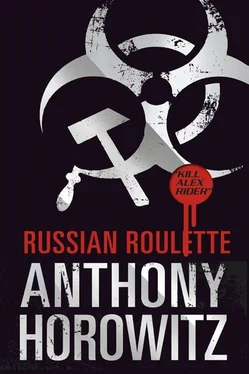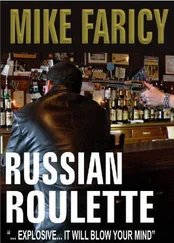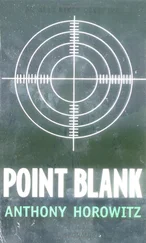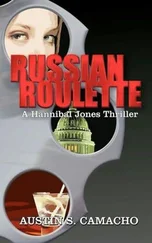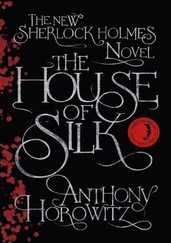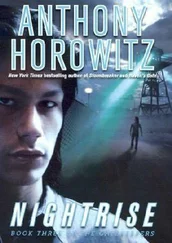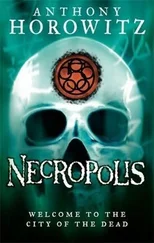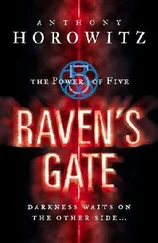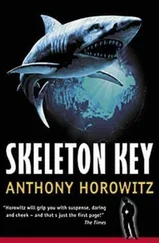“Please help me,” I said. “I’m not well.”
The two policemen had come to a dead halt, caught between two conflicting desires: one to hold onto me, the other to be as far away from me as possible. I was overacting like crazy, grimacing and staggering about like a drunk, but it didn’t matter. Just as I’d suspected, they’d been told how dangerous I was. They knew the stakes. Their imagination was doing half the work for me.
“Everyone died,” I went on. “They all died. Please… I don’t want to be like them.” I reached out imploringly. My hand was stained red. The two men stepped back. They weren’t coming anywhere near. “So much pain!” I sobbed. I fell to my knees. The juice dripped onto my jacket.
The policemen made their decision. If they stayed where they were, if they tried to force me to my feet, it would kill them… quickly and unpleasantly. Yes, they wanted their promotion. But their lives mattered more. Maybe it occurred to them that the very fact that they had come close to me meant they themselves would have to be eliminated. As far as they could see, I was dying anyway. I was lying on my side now, writhing on the ground, sobbing. My whole face was covered in blood. One of them spoke briefly to the other. I didn’t hear what he said but his colleague must have agreed because a moment later they had gone, hurrying back the way they had come. I watched them turn a corner. I very much doubted that they would report what had just happened. After all, dereliction of duty would not be something they would wish to advertise. They would probably spend the rest of the day at the bathhouse, hoping that the steam and hot water would wash away the disease.
I waited until I was sure they had gone, then got to my feet and wiped my face with my sleeve. At least the encounter had given me an advance warning. There was no way I was going to walk into the railway station at Kirsk. The moment I tried to buy a train ticket, there would be someone there to arrest me and I very much doubted the same trick would work a second time. If I was going to get onto a train to Moscow, I was going to have to think of something else.
And I already had an idea.
There had been quite a few passengers arriving in taxis and coming off buses just before I had been arrested and that suggested that the evening train might be coming soon. At the same time, I’d seen a number of porters running forward to help them with their luggage. Some of them had been boys, dressed in loose-fitting grey jackets with red piping down the sleeves. I don’t think they were employed officially. They were just trying to make a few kopecks on the side.
I made my way back towards the station – only this time I stayed behind the trees, close to the buildings, keeping an eye out for any policemen, mingling with the crowd. I soon found what I was looking for. One of the porters was sitting outside a café, smoking a cigarette. He was about my age, even if he was trying to disguise it with a beard and a moustache. They were both made of that horrible wispy hair that doesn’t really belong on a face. His jacket was hanging open. His cap sat crookedly on his head.
I sidled up next to him and sat down. After a while, he noticed me and nodded in my direction without smiling. It was enough.
“When’s the next train to Moscow?” I asked.
He glanced at his watch. “Twenty minutes.”
I pretended to consider this piece of information. “How would you like to make five rubles?” I asked.
His eyes narrowed. Five rubles was probably as much as he earned in a week.
“I’ll be honest with you, friend,” I said. “I’m in trouble with the police. I was almost arrested just now. I need to get on that train and if you’ll sell me your jacket and your cap, I’ll give you the cash.”
It was not such a big gamble. Somehow, I knew that this boy would be greedy. And anyway, most people in Russia would help you if you were trying to get away from the authorities. That was how we were.
“Why do the police want you?” he asked.
“I’m a thief.”
He sucked lazily on his cigarette. “I will give you my jacket and cap,” he said. “But it will cost you ten rubles.”
“Agreed.”
I took out the money, taking care not to show him how much I had, and handed over a single note. Tonight, this porter would drink himself into a stupor. He might invite his friends to join him. He handed me his coat and his cap – but I did not go straight to the station. I stopped at one of the stalls and used another four rubles to buy a pair of second-hand suitcases from an old man who had a whole pile of them. Quickly, I took off my outer clothes and slipped them into one of the cases. I put on the jacket and cap. Then, carrying the suitcases, I made my way to the station.
It seemed now that the police were everywhere. Was it possible that the ones who had arrested me had talked after all? They had thrown a ring around the entire building. They were in front of the ticket office, on the platform. But not one of them noticed me. I waited until a smart-looking couple – some sort of local government official and his wife – got out of a taxi and I followed them into the station. They did not look round. But to the police and to anyone else who glanced our way, it simply looked as if they had hired a porter and that the two almost empty cases I was carrying were theirs.
I had timed it perfectly. We had no sooner arrived at the platform than a train drew in. The evening train to Moscow. I followed my clients to their carriage and climbed in behind them. They were completely unaware of my presence and although I was out there, in plain sight, nobody challenged me.
This is something that has not changed to this day. People look at the clothes you are wearing without ever thinking about the person who is inside. A man with a back-to-front collar is a vicar. A woman in a white coat with a stethoscope around her neck is a doctor. It is as simple as that. You do not ask them for ID.
I stayed on the train and a few minutes later it left, very quickly picking up speed, carrying me into the darkness. I knew I would never return.
Kazansky Station. Moscow.
It is hard to remember my feelings as the train drew near to its final destination. On the one hand, I was elated. I had made it. I had travelled six hundred miles, leaving the police and all my other problems behind me. But what of this new world in which I was about to find myself? The train would stop. The doors would open. And what then?
Through the windows I had already seen apartment blocks, one after another, that must have been home to tens of thousands of people. How could they live like that, so many of them, piled up on top of each other? Then there were the churches and their golden domes, ten times the size of poor St Nicholas. The factories billowing smoke into a sky that was cloudless, sunless, a single sheet of grey. But all of these were dwarfed by the skyscrapers with their spires and glittering needles, thousands of windows, millions of bricks, rising up as if from some crazy dream. Of course I had been shown pictures of them at school. I knew they had been built by Stalin back in the 1940s and 1950s. But seeing them for myself was different. Somehow I was shocked that they did actually exist and that they really were here, scattered around the city, watching over it.
I had been fortunate on the train. There was an empty compartment right at the back with a bunk bed that folded down. That was where I slept – not on the bunk but underneath it on the floor, out of sight of the ticket collectors. The strange thing was that I managed to sleep at all, but then I suppose I was exhausted. I woke up once or twice in the night and listened to the train rumbling through the darkness and I could almost feel the memories slipping away… Estrov, Leo, my parents, my school. I knew that by the time I arrived in Moscow, I would be little more than an empty shell, a fourteen-year-old boy with no past and perhaps no future. There was even a small part of me that wished I hadn’t escaped from the police. At least, that way, I wouldn’t have to make any decisions. I wouldn’t be on my own.
Читать дальше
